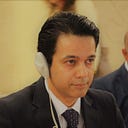Has Khamenei’s Statement Tonight Stopped A Coming War?
--
Despite all the tough rhetoric, Ayatollah Khamenei, the Supreme Leader of the Islamic Republic, tells top political and military officials in a religious-type gathering Tuesday night in Tehran that Iran does not want war with America.
Nothing surprising here.
The ayatollahs had long abandoned the name Great Satan for America and actively sought strong ties with Washington under the Obama administration. And in Afghanistan and Iraq until recently, the IRGC (Islamic Revolutionary Guard Corp) and Gen. Qassem Soleimani (who heads the external arm of IRGC responsible for meddling in neighboring countries) quietly cooperated with the United States military and intelligence on the ground.
In return, again under President Obama, the United States turned a blind eye as Iran and its top two militias, the IRGC and Hezbollah, expanded influence from Nigeria to Malaysia, through Yemen and the Gulf, and hosted elements of Taliban and Al-Qaeda as guests inside Iran but without allowing them to be operational.
The administration of President Trump now wants to contain the Iranian octopus in the region, benefiting from the fact that, except for Russia, India and maybe a few others in Europe, everyone else in Iran’s neighborhood wants to see the mullahs either gone or cut down to size.
Skeptics say, Khamenei, facing economic collapse and drying oil revenues, could be trying to buy time with today’s statement, or is trying to lure Washington into negotiations, which American officials say they will welcome only if Iran agrees to renegotiate the nuclear deal, including making missile development part of the talks and ending interference in countries across the region.
But the million-dollar question is this: Will the IRGC let go of this huge empire they created across the region that reflects strong religious, sectarian, and nationalist sentiments in Tehran? Is a containment or downsizing of the regime possible? And if Khamenei has decided to avoid war, does this mean he is ready to give those huge concessions demanded by Trump?
The ayatollahs in Tehran are in a tough spot. If they give in to Trump’s demands, they could lose power domestically in front of growing opposition from a younger generation not beholden to the forty-year-old Islamic rule. And if the ayatollahs confront America, they risk economic collapse.
